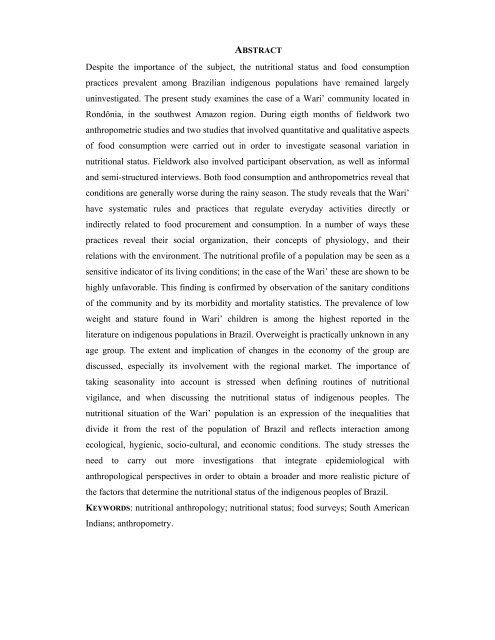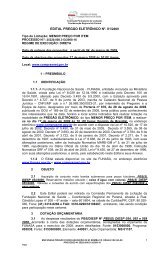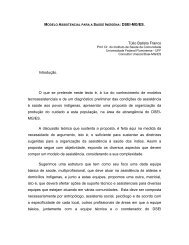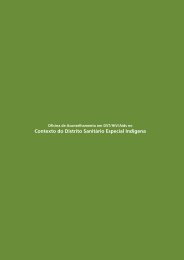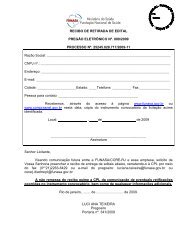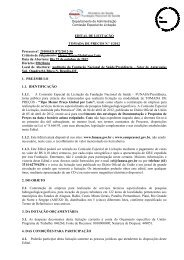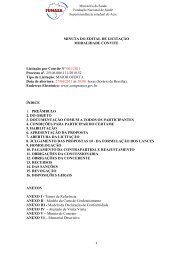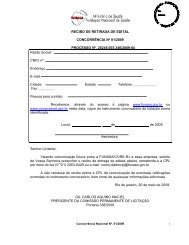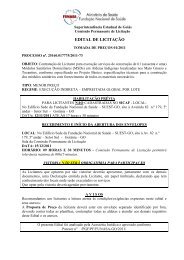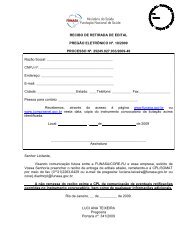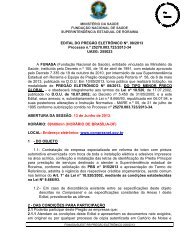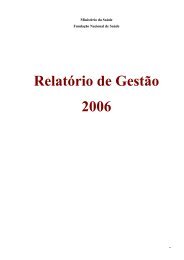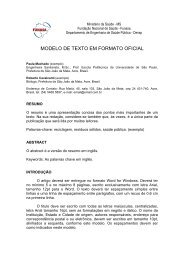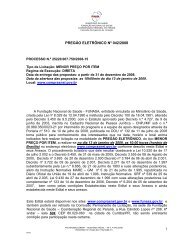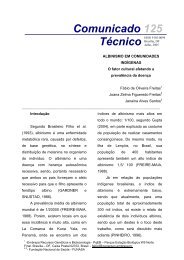- Page 1 and 2: MINISTÉRIO DA SAÚDEFUNDAÇÃO OSW
- Page 3 and 4: PARA MARIANE.E PARA HEDY.
- Page 5 and 6: Minhas idas a Porto Velho sempre ti
- Page 7 and 8: comigo seu tempo, suas idéias e su
- Page 9 and 10: CHAVE DE PRONÚNCIAA língua falada
- Page 11: RESUMOA despeito da relevância do
- Page 16 and 17: Tabela 6.3A Médias, desvios-padrã
- Page 18 and 19: LISTA DE FIGURASCAPÍTULO 2Figura 2
- Page 20 and 21: LISTA DE SIGLASAIS - Agente Indíge
- Page 22 and 23: 2situação nutricional wari’ pod
- Page 24 and 25: 4O trabalho de campo foi realizado
- Page 26 and 27: 6problemas nutricionais destas popu
- Page 28 and 29: 8problemas de ordem nutricional. Pa
- Page 30 and 31: 10assumindo tão somente a função
- Page 32 and 33: 12modo mais evidente pelos teórico
- Page 34 and 35: 14de uma abordagem que não se limi
- Page 36 and 37: 16O capítulo cinco - CONSUMO ALIME
- Page 38 and 39: CAPÍTULO 218OS WARI’2.1 POPULAÇ
- Page 40 and 41: 20Tabela 2.1: População nas Terra
- Page 42 and 43: 22informações compiladas por este
- Page 44 and 45: 24estabelecimento de contato perman
- Page 46 and 47: 262.4 OS WARI’ DE SANTO ANDRÉA a
- Page 48 and 49: 28Tabela 2.2: Razão de dependênci
- Page 50 and 51: 30“casas de farinha”, localizad
- Page 52 and 53: 32para a produção de farinha de m
- Page 54 and 55: 34de campo na T.I. Pacaas Novos, em
- Page 56 and 57: 36do Índio de Guajará-Mirim), apo
- Page 58 and 59: 38A caça é uma tarefa por princí
- Page 60 and 61: 40flutuações, ao longo do ano, na
- Page 62 and 63:
42Para além do caso específico da
- Page 64 and 65:
44André, de onde é escoada para G
- Page 66 and 67:
46outras aldeias, pensando na possi
- Page 68 and 69:
48de qualquer proibição ou desest
- Page 70 and 71:
50tradicionalmente dedicadas ao cul
- Page 72 and 73:
521) a opção pela mandioca não e
- Page 74 and 75:
54comercializáveis, dentre outros.
- Page 76 and 77:
56aparentemente óbvia, esta ressal
- Page 78 and 79:
58Havia, por exemplo, um comércio
- Page 80 and 81:
60monetarização de relações ant
- Page 82 and 83:
62dá para o irmão. Aí, desconta.
- Page 84 and 85:
CAPÍTULO 464PRÁTICAS ALIMENTARES4
- Page 86 and 87:
66de outras pessoas; pode-se, por e
- Page 88 and 89:
68atividades diárias. Os eventos a
- Page 90 and 91:
70próximo ao meio-dia e ao entarde
- Page 92 and 93:
72adoção de novas práticas alime
- Page 94 and 95:
74comida, elogiou o sabor, a quanti
- Page 96 and 97:
76farinha é particularmente apreci
- Page 98 and 99:
78crianças, que invariavelmente fi
- Page 100 and 101:
80(“-Maho ma?”) ou, ainda, se e
- Page 102 and 103:
82primariamente entre consangüíne
- Page 104 and 105:
84É importante, por fim, reiterar
- Page 106 and 107:
86Os exemplos se sucediam em nossas
- Page 108 and 109:
88mudanças observadas nas prática
- Page 110 and 111:
90A aceitação da idéia de que os
- Page 112 and 113:
92assim, um “núcleo” de idéia
- Page 114 and 115:
94característica fundamental para
- Page 116 and 117:
96ou de sua apreciação pelas gord
- Page 118 and 119:
98“ajudavam” muito. “-Awi tam
- Page 120 and 121:
1004.4.2 CORPORALIDADEDurante o seg
- Page 122 and 123:
102Um último exemplo parece confir
- Page 124 and 125:
104além disso, a real possibilidad
- Page 126 and 127:
106no sentido de pressioná-los a c
- Page 128 and 129:
108atenção é que os comentários
- Page 130 and 131:
110maior parte das crianças menore
- Page 132 and 133:
112após o nascimento, era porque h
- Page 134 and 135:
114maior parte das vezes, a própri
- Page 136 and 137:
116ficavam famintas, porque davam-l
- Page 138 and 139:
118que orientava a utilização da
- Page 140 and 141:
120com mowi pelo bebê era extremam
- Page 142 and 143:
122O panorama observado em Santo An
- Page 144 and 145:
124sobre a questão em outros momen
- Page 146 and 147:
126FARTURA E ESCASSEZ: O MILHO COMO
- Page 148 and 149:
128relações entre indivíduos e g
- Page 150 and 151:
130A análise do consumo alimentar
- Page 152 and 153:
132Além disso, era fundamental que
- Page 154 and 155:
134alimentares de populações nati
- Page 156 and 157:
136conseqüentemente a receptividad
- Page 158 and 159:
138Tabela 5.2 (cont.)DomicílioCara
- Page 160 and 161:
140procurava-se obter, quando retor
- Page 162 and 163:
142adquirida, armazenada, dividida
- Page 164 and 165:
144Há que se considerar, no entant
- Page 166 and 167:
146Um aspecto para o qual desejo ch
- Page 168 and 169:
Quadro 5.1 (cont.)casa 4 casa 5maio
- Page 170 and 171:
150foram registrados nos domicílio
- Page 172 and 173:
Casa 3:152maionovembrooutros49%fari
- Page 174 and 175:
154acompanhados. A atividade contri
- Page 176 and 177:
156ciclo anual, a venda de farinha
- Page 178 and 179:
158esforço, do tronco de uma únic
- Page 180 and 181:
160a pesca começava a se tornar no
- Page 182 and 183:
Casa 4:162maionovembroanimaisdomés
- Page 184 and 185:
164FONTES PROTEICAS: A PESCA. A pes
- Page 186 and 187:
166que se tenha uma idéia mais pre
- Page 188 and 189:
168Mirim, exceto por alguns cortes;
- Page 190 and 191:
170Casa 2mercado regional2,08,2agri
- Page 192 and 193:
172Figura 5.3B: Contribuição das
- Page 194 and 195:
174Fontes proteicas: média geralin
- Page 196 and 197:
176Casa 3%80706068,974,95040302013,
- Page 198 and 199:
178palmito, da banana e do açaí.
- Page 200 and 201:
180mandioca não interfere na colet
- Page 202 and 203:
182tradicionais, e que a sua incorp
- Page 204 and 205:
184alimentares, mas para uma relaç
- Page 206 and 207:
186por sua vez interrelacionados: o
- Page 208 and 209:
188quantidades verdadeiramente abus
- Page 210 and 211:
190O primeiro critério revela o pa
- Page 212 and 213:
192financeiros apresentadas pelos d
- Page 214 and 215:
194grupo que caracterizou-se por um
- Page 216 and 217:
Figura 5.5: Distribuição dos valo
- Page 218 and 219:
198nos valores de massa corporal de
- Page 220 and 221:
200populações e, para alguns grup
- Page 222 and 223:
202do ano bastante distintas, e que
- Page 224 and 225:
204Assim, a partir dos valores de m
- Page 226 and 227:
206As Figuras, numeradas de 6.1 a 6
- Page 228 and 229:
208Figura 6.1B. Médias de estatura
- Page 230 and 231:
210peso para a estatura, portanto,
- Page 232 and 233:
212Figura 6.2A. Escores z médios p
- Page 234 and 235:
214SAZONALIDADE E ESTADO NUTRICIONA
- Page 236 and 237:
216nutricional nesta faixa etária
- Page 238 and 239:
218Figura 6.3A. Médias de estatura
- Page 240 and 241:
220SAZONALIDADE E PERFIL NUTRICIONA
- Page 242 and 243:
222Figura 6.4B. Médias de IMC de a
- Page 244 and 245:
224observa um aumento da massa corp
- Page 246 and 247:
226vulnerabilidade feminina: enquan
- Page 248 and 249:
228desenvolvidos seriam adequadas p
- Page 250 and 251:
230epidemiológico da população i
- Page 252 and 253:
232validade dos parâmetros atualme
- Page 254 and 255:
234et al., 2000), a persistência d
- Page 256 and 257:
236Os estudos revistos por Beckerma
- Page 258 and 259:
238lhes prestam assistência (FUNAI
- Page 260 and 261:
240Cabem aqui algumas consideraçõ
- Page 262 and 263:
242Tabela 6.1A. Médias, desvios-pa
- Page 264 and 265:
244Tabela 6.3A. Médias, desvios-pa
- Page 266 and 267:
246Tabela 6.6A. Médias, desvios-pa
- Page 268 and 269:
248Tabela 6.9A: Distribuição abso
- Page 270 and 271:
250Tabela 6.2B. Médias, desvios-pa
- Page 272 and 273:
252Tabela 6.4B. Distribuição abso
- Page 274 and 275:
254Tabela 6.7B: Médias, desvios-pa
- Page 276 and 277:
CAPÍTULO 7256DISCUSSÃO FINAL E CO
- Page 278 and 279:
258histórica, ambiental, social e
- Page 280 and 281:
260observadas nas condições de nu
- Page 282 and 283:
262mortalidade, os problemas com a
- Page 284 and 285:
264proteínas de alto valor biológ
- Page 286 and 287:
266A aparente obviedade das associa
- Page 288 and 289:
268participação de organizações
- Page 290 and 291:
270alimento (vide capítulo 5 - PR
- Page 292 and 293:
272similar à mandioca - não ao tu
- Page 294 and 295:
274possibilitada por não resultar
- Page 296 and 297:
276modo, o eventual diagnóstico de
- Page 298 and 299:
278haja um saldo positivo, como dis
- Page 300 and 301:
280beneficiamento dos produtos, mas
- Page 302 and 303:
282despeito da presença por vezes
- Page 304 and 305:
284comercialização da farinha. Fr
- Page 306 and 307:
286ausência de estudos que avaliem
- Page 308 and 309:
288exatamente uma exceção, no con
- Page 310 and 311:
290caracterizada pela vulnerabilida
- Page 312 and 313:
CAPÍTULO 8292REFERÊNCIASArantes,
- Page 314 and 315:
294Coimbra Jr., C. E. A., 1984. Est
- Page 316 and 317:
296População. Projeto BRA/ 94/ 00
- Page 318 and 319:
298Fagundes Neto, U.; Baruzzi, R. G
- Page 320 and 321:
300Habicht, J. P.; Martorell, R.; Y
- Page 322 and 323:
302Kuhlman, E., 1977. Vegetação.
- Page 324 and 325:
304Morais, M. B.; Fagundes-Neto, U.
- Page 326 and 327:
306Ribas, D. L. B. & Philippi, S. T
- Page 328 and 329:
308aculturada da região amazônica
- Page 330 and 331:
310Weiss, K. M.; Ferrell, R. E. & H
- Page 332 and 333:
Anexo 1312
- Page 334 and 335:
Anexo 3314
- Page 336:
Anexo 5316


